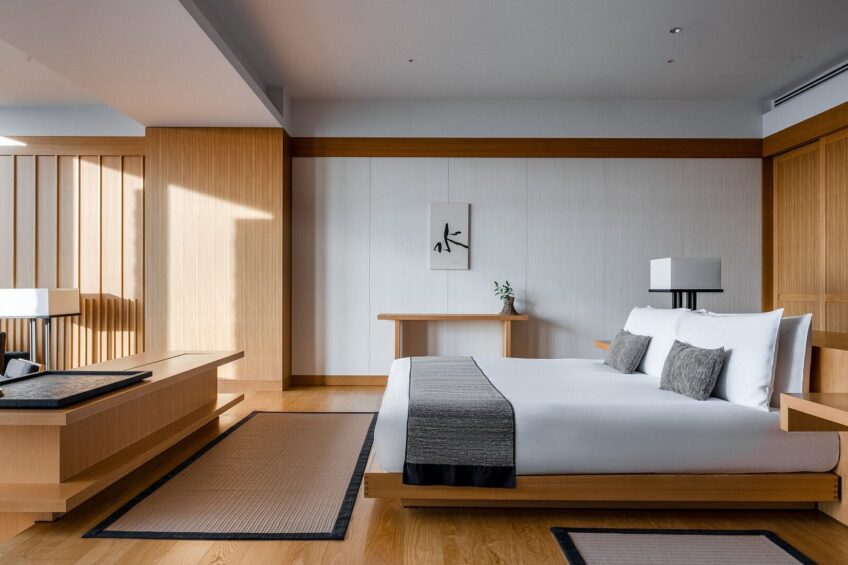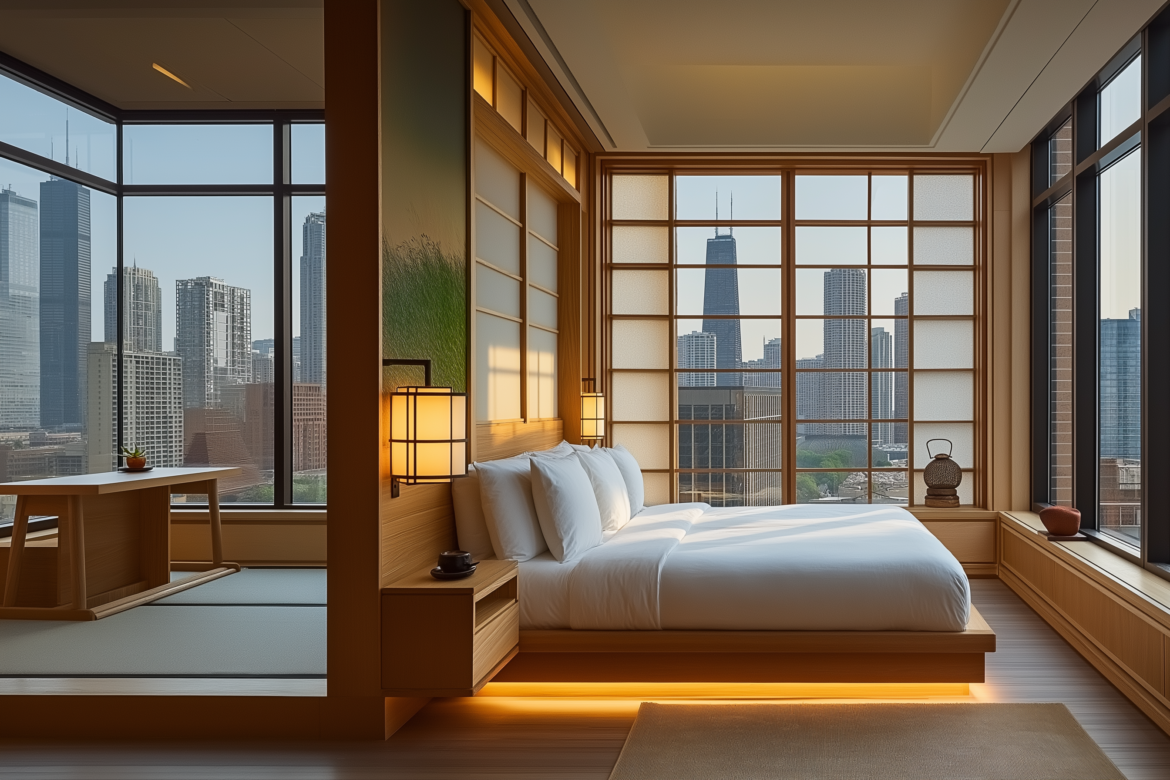Explore Zen-inspired bedroom designs that blend traditional Japanese aesthetics with modern urban sophistication to redefine hospitality.
-Where the pulse of the city meets the stillness of Zen, discover how thoughtful design creates sanctuaries that restore the soul and inspire the spirit
There is something profoundly moving about stepping into a space that feels like it was designed to listen, to breathe with you, and to hold you gently. This was my experience traveling through Kyoto, where every detail seemed infused with purpose. Inspired by these travels, I’ve sought to translate the timeless beauty of Zen design into modern spaces that offer tranquility, balance, and connection—even in the busiest urban environments.
These designs are not just ideas; they’re whispers of stillness, deeply rooted in tradition yet undeniably relevant to the way we live today. Let me take you on this journey—from serene landscapes to a reimagined urban retreat.
1. Inspirations from Kyoto: The Art of Balance
Kyoto’s soul lies in its ability to make you pause. From the soft translucence of Shoji panels to the gentle rustle of maple leaves, it invites stillness and gratitude. These images from my journey reflect the foundational elements of Japanese design—restraint, balance, and a profound connection to nature. They encapsulate the essence of this philosophy, which I’ve seamlessly woven into my design work.
- Shoji Serenity
A harmonious bedroom that brings the essence of Zen into everyday life. Shoji panels filter light into a soft, ambient glow, creating a tranquil atmosphere that feels rooted in simplicity and elegance. The balance of natural tones and handcrafted furniture reflects the Japanese philosophy of purposeful design.

A serene corner where natural wood and traditional Shoji panels evoke harmony, embracing the calming spirit of Zen design.
- Nature Framed
A serene retreat where expansive windows open to lush greenery, blurring the lines between indoors and out. The soft blues of the bedding, inspired by indigo textiles, complement the warmth of natural wood, creating a space that invites rest and reflection.

Modern Zen meets nature with expansive views and minimalist design, creating a perfect urban retreat.
- Geometric Harmony
A space that fuses bold modernity with the softness of traditional Japanese design. Geometric accents in muted gold and deep blue lend a contemporary edge, while natural materials like stone and wood bring grounding warmth. This room is a perfect marriage of innovation and authenticity.

A harmonious fusion of geometry and natural materials, where Zen principles meet modern design.
A Garden Refuge
This bedroom embraces the quiet beauty of nature, with a Japanese maple just beyond the window. Handwoven throws and bamboo lanterns add layers of texture, while every piece—down to the smallest accessory—feels deliberate and meaningful. A true sanctuary for the soul.

A tranquil retreat showcasing the elegance of Zen design through natural materials and soothing light.
- Textural Layers
A close-up view of a Zen-inspired corner, where delicate fabrics, rustic ceramics, and natural woods create a layered narrative of calm. The interplay of light and shadow, along with the muted earth tones, makes this space feel both intimate and expansive.

Grounded in Zen principles, this space bridges traditional Japanese aesthetics with modern comfort.
2. Urban Zen: A New Interpretation
The timeless principles of Zen design can thrive even in the heart of a bustling metropolis. One of the finest examples of this is the Aman Tokyo, featured as Architectural Digest’s Hotel of the Week.
Aman Tokyo: A Modern Zen Sanctuary
Perched atop a skyscraper, the Aman Tokyo redefines Zen for the urban traveler. Its interiors elegantly blend Shoji-inspired screens, natural materials, and panoramic city views, creating a serene retreat in the heart of a bustling metropolis. Much like a Kyoto temple, the design embodies stillness and harmony, offering a counterbalance to the city’s fast-paced rhythm.
As highlighted this week in Architectural Digest, Aman Tokyo illustrates how traditional Japanese design principles can seamlessly integrate into modern hospitality, offering a unique blend of tranquility and luxury.
Key highlights of Aman Tokyo’s design include:
- Shoji Elegance: Sliding panels soften the stark lines of urban architecture, allowing light to flow freely and transform the space throughout the day.
- Natural Materials: The tactile beauty of stone, wood, and paper fosters a profound connection to nature, even amidst Tokyo’s urban sprawl.
- Borrowed Scenery (Shakkei): Floor-to-ceiling windows frame the Tokyo skyline, blending the tranquility of Zen with the energy of the cityscape.
Aman Tokyo exemplifies how traditional Zen principles—harmony, balance, and simplicity—can adapt to modern urban environments. For travelers seeking moments of stillness in a fast-paced world, it offers a sanctuary of calm and reflection while embracing the energy of the bustling metropolis.

Aman Tokyo exemplifies the elegance of Zen design with its minimalist aesthetic, natural materials, and tranquil ambiance—a true sanctuary in the heart of the city. Image courtesy @AmanResorts
3. Reimagining Zen for Urban Landscapes
Inspired by my experiences in Japan and the urban sophistication of spaces like Aman Tokyo, I’ve envisioned a new project: a hotel room concept that blends the tranquility of Zen with the energy of a modern American metropolis. Here, the goal is not simply to create a space but to craft an experience—a retreat that offers balance amidst the chaos of city life.
This concept redefines the traditional hotel room by merging natural elements, thoughtful design, and contemporary functionality. It transforms the hotel bedroom into a sanctuary where guests can find calm, clarity, and connection.

Borrowed scenery (‘shakkei’) brings the beauty of nature into this calming, minimalist space. Project and Visualization @StudioJoelleMagazine
Why Zen Design Matters in Urban Hospitality
In a world of constant movement and overstimulation, Zen design stands as a quiet counterpoint—a philosophy that transcends aesthetics to meet the emotional and psychological needs of today’s traveler. More than a style, it is an approach to creating spaces that nurture clarity, connection, and calm, offering a reprieve from the chaos of modern life.
- Simplicity as a Path to Clarity
Zen design begins with the art of subtraction. By eliminating visual noise, these spaces invite a sense of order and stillness. Clean lines, intentional layouts, and minimal decor work together to create environments that foster focus and mindfulness. - Nature as the Ultimate Companion
Urban environments often lack the grounding presence of nature, but Zen-inspired spaces bridge this gap by bringing the outdoors in. Natural materials like wood and stone, earthy textures, and large windows that frame greenery or skyline views evoke a connection to the world beyond. - Harmony Through Space and Flow
The Japanese principle of ma, or intentional negative space, is a cornerstone of Zen design. Open layouts and balanced proportions create a flow that feels effortless yet deeply calming. - Spaces That Restore the Soul
Hospitality today is no longer just about comfort—it’s about transformation. Zen-inspired interiors serve as sanctuaries for the mind, body, and soul. - Timeless Design for a Global Audience
Zen design’s focus on simplicity and balance gives it a universal appeal that transcends cultural boundaries.

Project and visualization : @StudioJoelleMagazine
The Enduring Relevance of Zen
Zen design isn’t just about creating beautiful spaces; it’s about crafting meaningful experiences. It reminds us that simplicity, connection, and intentionality are as vital in design as they are in life. In an era defined by constant stimulation, spaces rooted in Zen principles resonate deeply, offering travelers more than just a room—they offer a sense of clarity and renewal.
To learn more about Japanese architectural principles, explore this guide to Zen interiors.
For more design insights and inspirations, visit Studio Joelle Magazine, where creativity meets innovation in the world of luxury interiors.
